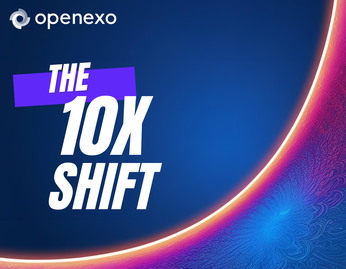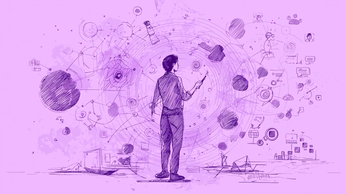
Do Businesses Head For an Apocalyptic or Prosperous Future? Enhancing Human Well-Being and Organizational Performance with Artificial Intelligence
Taking AI as an example, this exponential growth means that the computational speed of AI doubles approximately every 3.4 months, according to Stanford’s University AI index.
New technologies are disrupting society and organizations at a rapid pace. Technologies like artificial intelligence (AI), blockchain, 3D printing, nanotechnology, and many more are growing exponentially instead of linearly. Taking AI as an example, this exponential growth means that the computational speed of AI doubles approximately every 3.4 months, according to Stanford’s University AI index (Perrault et al., 2019, p. 5)
This tremendous growth combined with the fact that AI allows businesses to optimize existing processes and deliver new value to customers makes AI imperative for businesses to maintain competitiveness in the future (Fuze, 2018, pp. 1-8). Thus, it comes with no surprise that an increasing number of companies adopt AI for enhancing the organization’s performance. But not everyone shares the excitement about AI. Many employees are concerned about the effect AI adoption entails for their job and their well-being
For allowing management to consider the employees’ interests when introducing AI, I recently interviewed experts and employees about how they experience the impact on engagement when AI is introduced. In this article, I am sharing with you the most important results of the research and therefore allow you to better understand the concerns of employees and what your company can do to have a more human-centered adoption of AI in your business.
Negative experiences of employees
The findings of the interviews showed that employees experience a variety of negative experiences when AI is implemented in an organization. Many employees are, for example, anxious about losing their job. They are worried that AI will substitute their knowledge and expertise and fear that AI will take over their tasks, making them obsolete. The following comment of an expert illustrates this point further:
“We are dealing with the realm of complexity here. So, one human being may be running away because they have a challenge or a learning disability with regard to new things, and it's harder for them to learn new things. And so, then they have all these associations of challenges that they had when they were a child, when they were in school. And you might have another person who's running away because their job is at stake, and they have a mortgage and mouths to feed. And they're super freaked out about the fact that they're going to lose their job if they fail at this particular new technology” (Expert Interview)
Besides job security, the interviews demonstrated that the jobs and tasks of employees are changing when AI is implemented, and employees are worried about these changes. Some employees regard the introduction of AI as competition; others are not seeing the benefit the technology entails for them. A reason for the negative perception could be that some employees are not aware how their future job might look like and fail to understand the benefit the change entails for them. One comment of an employee underlines this point:
“They did not give me at the beginning the potential benefits they [the new AI solution] will have for me in my job. I did not know. They didn’t tell me that” (Employee Interview)
Next to jobs and tasks, employees and experts highlighted in the interviews that people require additional training about AI when the technology is implemented. The findings further indicate that some employees are neither aware of the benefit of the technology nor do they know how the technology is supposed to deliver value to them or their clients. Absent any training and development during the implementation phase of AI, some employees feel overwhelmed with the technology and are uncertain how to utilize it.
“But I would like sometimes that the company gave me more inputs or more something to know about it. So, this is this course about artificial intelligence, machine learning, things that are getting done in the world. Or this is how, I don't know, these new technologies work in Europe or Asia. That kind of stuff, more material on, more tools to get used to the technologies”(Employee Interview)
Besides learning and development, the interviews illustrated that many employees experience stress and a high level of discomfort when AI is introduced in a company. The findings further suggest that some employees develop mental illnesses such as burnout as they experience AI as a threat to their job early in the adoption process.
“They get their high level of discomfort or getting burned out and all that stuff. And that's what you see a lot. Because they cannot give it a rational place in their line of thought, then things start to happen mentally, physically, and whatever you can think of” (Expert Interview)
On top of employee well-being, the findings of the interviews demonstrated that some employees are not involved when AI is introduced in a company. Involvement is essential to reach high engagement levels and employees must have a chance to contribute and asks questions. A comment from an expert interview showcases that involvement and communication is still not a standard in the AI adoption process:
“And unfortunately, what's happening is that we're asking people to jump from an unknown variable and something they're not familiar with, which is already setting off that flight or freeze response, and we're asking people to jump into action and we're not giving them any opportunity to have conversations around how it's relevant to them, to have conversations about them, shifting their definitions about why it matters and what's important. We're not having conversations that's offering them opportunity to decide to give dissent because dissent is huge, consent is huge. And most leaders have no idea how to have those conversations and how to even allow those conversations to happen and to be voiced” (Expert Interview)
The results of the interviews suggest that employees commonly have a negative experience during the introduction of AI, especially in terms of job security, employees’ jobs and tasks, learning and development, employee well-being, and communication. The question arises now, what can change managers and organizations do to keep engagement levels high during the adoption of AI?
Enhancing employee experience during the adoption process
The experts highlighted a variety of approaches to enhance employee engagement during the introduction of AI ranging from employee involvement and communication, providing further training and development opportunities, listening to employees’ concerns, having a solid purpose, and recognizing and valuing employees. For the change managers among us, most of these elements are common tools to facilitate change in organizations and if you would like to read more about them you can reach out to me to get access to the entire research.
What I would like to highlight in this article, however, is the fact that most organizations treat employees as an obstacle towards change that must be overcome. This means, we consider engagement as a transactional tool, that merely allows the company to achieve their corporate objectives. Organizations use communication, training and development, and other tools to a means to an end. They do not genuinely care about the interests of employees.
“There is a human element here, you're going after people with shock and awe. And then you're bulldozing them into stuff, and that is not sustainable, it's not thrivable” (Expert Interview)
I would argue, it is about time to change from this transactional perspective to a human-centered perspective. It is necessary to exhibit genuine interest in the human being, to recognize their contributions and efforts, and to appreciate their role in the organization permanently, irrespective of the events and changes that are ongoing in the organization. The purpose of AI should be to better the lives of people. In terms of an organization, this could mean installing artificial intelligence to assist human experiences and capabilities, augmenting human beings, and enhancing love, joy, and happiness among employees. This genuine and honest focus on the human being when adopting AI could be the first step towards a prosperous future for all of us. A future where AI assists us. A future where AI is enhancing human well-being. A future where AI leads to the betterment of people’s live. I would argue that this is a journey worth embarking on.

ExO Insight Newsletter
Join the newsletter to receive the latest updates in your inbox.









